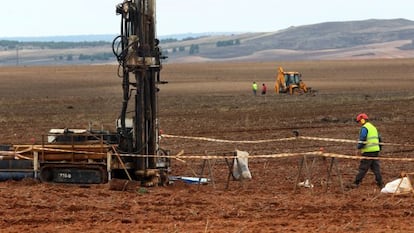Environmentalists fear sinking land under planned nuclear site
Public corporation due to build storage plant admits to the possible existence of "relevant geotechnical risks"

Enresa, the public corporation that is planning to build a radioactive waste storage facility (ATC) in Villar de Cañas, a village of 431 residents in Cuenca province, admits to the possible existence of "relevant geotechnical risks" that could result in cave-ins.
A technical report available on Enresa's website shows that the site's greatest potential danger is "the existence of karst formations created out of gypsum," a soft mineral that could dissolve and create cave-ins and other land depressions. The document talks about "possible consequences that are not to be overlooked."
This same study, which dates from July 2012, underscores the presence of sinkholes in the same gypsum area where the site of the nuclear waste storage facility is currently planned. Karst formations, easily spotted because of the numerous sinkholes, caves and other depressions left behind by the receding waters, are plentiful in Spain, one leading example being Cuenca's Ciudad Encantada.
The rising levels of the Záncara river, which runs just 500 meters from the land where the storage space will go up, has also caused alarm among the experts. The water has come as close as 300 meters from the plot, according to some estimates, and even though the area is not flooded, a group that opposes the project — Plataforma contra el cementerio nuclear de Cuenca — insists that the existence of soft, soluble mineral in the area poses too many dangers to build a nuclear waste storage site there. The gypsum could dissolve through water filtrations from the outside or through horizontal movements, said a spokesperson for the group.
Enresa chairman Francisco Gil Ortega said in a congressional appearance on November 27 that land drilling was being carried out "every 30 meters" to know "with certainty" what the terrain is like, according to the regional daily La Tribuna de Toledo.
This last Thursday, the Socialist Party's regional branch in Castilla-La Mancha released a series of images aiming to prove that the designated piece of land was flooded by the recent rains.
The public corporation, which contemplated worst-case scenarios in which the Záncara river reaches a flow of 3,000 cubic meters (significantly above any recorded level), on Friday issued a statement saying that the sounding tests it has carried out at depths of between 20 and 124 meters have proved "there is no risk of karst formations under the plot chosen," and that therefore the risk of the land subsiding was immaterial. Endesa said that the June report was carried out by the Interministerial Commission using only bibliographic material.
Endesa said Friday that the clay and gypsum of the area was "apt" for the ATC, also noting the "low permeability" of the sub-strata and claiming the area is "floodproof."
"The logical thing would be for these studies to be carried out before [selecting the site], not after," says Carlos Villeta, co-spokesman for the platform and a member of Ecologists in Action. This association also notes that the site is 2,000 meters from the population center, just barely respecting the legal limit for facilities of this nature.
Tu suscripción se está usando en otro dispositivo
¿Quieres añadir otro usuario a tu suscripción?
Si continúas leyendo en este dispositivo, no se podrá leer en el otro.
FlechaTu suscripción se está usando en otro dispositivo y solo puedes acceder a EL PAÍS desde un dispositivo a la vez.
Si quieres compartir tu cuenta, cambia tu suscripción a la modalidad Premium, así podrás añadir otro usuario. Cada uno accederá con su propia cuenta de email, lo que os permitirá personalizar vuestra experiencia en EL PAÍS.
¿Tienes una suscripción de empresa? Accede aquí para contratar más cuentas.
En el caso de no saber quién está usando tu cuenta, te recomendamos cambiar tu contraseña aquí.
Si decides continuar compartiendo tu cuenta, este mensaje se mostrará en tu dispositivo y en el de la otra persona que está usando tu cuenta de forma indefinida, afectando a tu experiencia de lectura. Puedes consultar aquí los términos y condiciones de la suscripción digital.









































